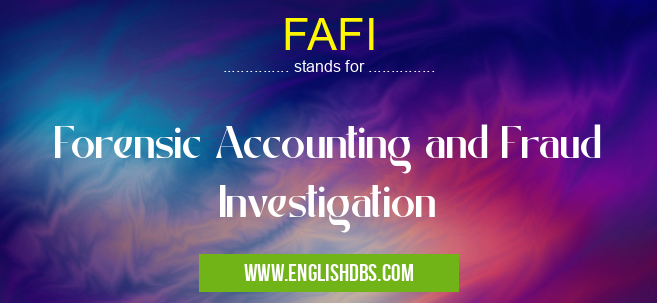What does FAFI mean in ACCOUNTING
Forensic Accounting and Fraud Investigation (FAFI) is an important area of accounting that combines the skills used by public accountants, auditors, lawyers, and investigators to detect and investigate both civil and criminal cases of financial misconduct. FAFI focuses on reviewing financial records, accounts receivable, accounts payable, investments, and other documents for potential indicators of fraud in order to assess the accuracy and reliability of a company’s financial statements. By utilizing specialized techniques to analyze data and identify irregularities, FAFI can help establish the facts related to a wide variety of suspected frauds.

FAFI meaning in Accounting in Business
FAFI mostly used in an acronym Accounting in Category Business that means Forensic Accounting and Fraud Investigation
Shorthand: FAFI,
Full Form: Forensic Accounting and Fraud Investigation
For more information of "Forensic Accounting and Fraud Investigation", see the section below.
» Business » Accounting
Meaning & Purpose
FAFI broadly looks at the general ledgers, journals, bank statements and other financial documents with an investigative eye to uncover fraudulent activities that have been committed by either individuals or businesses. In addition to performing analysis on these documents in order to expose discrepancies or inconsistencies in business transactions or accounting practices which may indicate potential fraud or misappropriation of funds, FAFI also looks at any prior investigations into similar activity and examines relevant laws governing the situation. Through a focused approach that applies established process-based methodologies along with advanced technology tools such as Artificial Intelligence (AI) powered analytics platforms; FAFI can identify complex inconsistencies between transactions when manual analysis is not feasible.
Benefits
Relying on forensic accounting tools instead of basic audit procedures can greatly improve investigation efficiency because it decreases the amount of time needed for document review while simultaneously reducing any chances for human error. Forensically examining financial information allows investigators to quickly flag suspicious patterns or inconsistent transactions that may indicate fraud risk areas. Furthermore, evidence found through this type of analysis can provide more concrete proof when compared against traditional audit methods which rely more heavily on opinion-based judgement. The use of forensic account investigative services also helps organizations internally resolve matters related to income tax law compliance along with identifying loopholes in order detect tax evasion schemes — saving businesses from costly penalties resulting from audits conducted by external regulatory authorities.
Essential Questions and Answers on Forensic Accounting and Fraud Investigation in "BUSINESS»ACCOUNTING"
What is Forensic Accounting?
Forensic accounting is a specialty practice area of accounting that describes engagements that result from actual or anticipated disputes or litigation. It includes investigative assignments such as analyzing financial data to determine if fraud has occurred and quantifying the economic damages associated with alleged wrongful or negligent acts.
What are some common types of fraud investigations?
Investigative assignments may include matters such as financial statement misrepresentations, embezzlement, corruption, asset misappropriation, tax evasion, kickbacks, money laundering and other activities.
How does forensic accounting differ from traditional auditing?
Traditional auditing focuses on compliance with standards and reporting standards while forensic accounting focuses on investigating potential economic damage due to potential fraud or negligence. While standard audit procedures involve inquiry and testing of financial records there is greater emphasis in forensic accounting in reviewing individual transactions for indications of criminal activity.
What are the services offered by a forensic accountant?
A forensic accountant typically investigates and analyzes financial information in order to offer advice concerning litigation support issues like economic damages calculations, fraud detection and prevention, corporate governance advisement, bankruptcy analysis or other advice related to legal proceedings.
Who typically hires a forensic accountant?
Clients who hire a forensic accountant range from individuals involved in civil proceedings involving complex elements of finance and legislation to government agencies or international corporations with an interest in preventing fraudulent activities from occurring within their organizations.
How do investigation techniques used by a forensic accountant vary from those employed by police officers?
Unlike police officers who often rely on physical evidence alone when conducting an investigation, forensic accountants use various investigative tools such as interviewing witnesses as well as methodically analyzing financial records for inconsistencies which could indicate fraudulent activity took place.
How can businesses protect themselves against fraud investigations?
Businesses should implement measures such as training staff members on identifying suspicious behavior; having internal controls for handling cash; setting up policies regarding how checks are authorized; create protocols that promote accurate record keeping; ensuring any access to sensitive information is restricted only to those who need it; conduct surprise audits regularly.
What must be done when preparing for an actual court trial involvingForensic Accounting & Fraud Investigations?
When preparing for court trial involving FAFI it is important that a professional team be established including counsels representing all sides of the case plus relevant experts - like lawyers specialised in white collar crime - getting together priorly to exchange any available documentary proof regarding the case like sworn statements or court documents. In addition it is important that evidence must meet the requirements set out by applicable rules which will depend on the jurisdiction where a case is being heard.
Are there any certifications required to become a Forensic Accountant & Fraud Investigator?
There are no specific certifications required although most professionals working within this field tend to hold valid certifications issued by professional bodies like The American Institute of Certified Public Accountants (APICA) which provides education and certification options related to this profession.
Final Words:
In summary Forensic Accounting & Fraud Investigation (FAFI) is an important field within modern accounting practices that helps uncover potentially suspicious patterns in financial data as well as aiding with internal income tax regulation compliance checks across organizations. Utilizing sophisticated analytical tools like AI powered platforms significantly reduces manual effort while allowing investigators better leverage their resources towards detecting hidden irregularities linked to cases involving fraudulent or misappropriated activities within companies.
